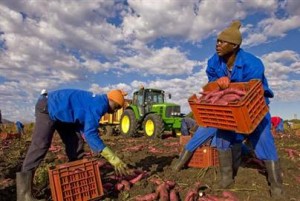National Post (Toronto) | Wednesday, October 21, 2009
Peter Goodspeed
Fearing land reforms may soon stifle their businesses, white South African farmers are preparing to trek deeper into Africa.
In one of the biggest land deals in African history, the government of the Republic of Congo agreed this week to lease up to 200,000 hectares of abandoned farmland to South African farmers over the next 30 years.
The white farmers, who could lose up to 30% of their land in South Africa over the next five years from land reform, are being invited to start growing corn, cotton and soybeans, and to raise poultry and cattle on the state-run collective farms abandoned more than a decade ago.
A delegation of a dozen farmers is expected to travel to Congo next month to do soil tests and assess the grazing potential of the 200,000 hectares, an area about half the size of Prince Edward Island.
Ultimately, the farmers could gain access to more than 10 million hectares of underused Congo farmland.
South Africa's beleaguered white farmers are jumping at the opportunity to expand deep into the continent. Nearly 1,700 of them have filed queries about the deal with their union, Agri SA.
"The motivation for South African farmers is simple," said Theo de Jager, Agri SA's deputy president, who helped negotiate the deal with Congo.
"Because of the economies of scale, it is virtually impossible to reach a level of profitability here. We do not have enough land or water and land reform is putting a lot of pressure on these natural resources.
"One in four farms must be redistributed in the next four or five years. So for new entrants into the sector and for those farmers who want to expand there is nowhere to go."
Land reform is an emotional issue in South Africa. Millions of blacks were made landless under British colonial and apartheid rule. By the time apartheid ended in 1994, whites, who formed just 10% of the population, owned more than 90% of the land.
Nelson Mandela and later African National Congress governments vowed to change that and set a target of redistributing 30% of the country's agricultural land by 2014.
So far, only about 5% has changed hands.
Now, as the government of Jacob Zuma prepares to pick up the pace of land reform, the white farmers are growing worried.
"Government has stopped paying market value for redistribution, so farmers are reluctant to invest in their own farms," said Mr. de Jager. "They don't know if they'll be able to keep it a few years from now."
The disastrous example of land reform in neighbouring Zimbabwe has done little to ease their concerns.
President Robert Mugabe plunged his country into unprecedented crisis by forcibly and sometimes violently expropriating white-owned farms. Thousands of white farmers fled, farm output plunged and Zimbabwe's agriculturally dependent economy collapsed.
But rather than flee, South Africa's farmers have begun to look to expand their opportunities elsewhere, while retaining as much of their farm operations as possible at home.
In recent months Agri SA has fielded offers of land leases for agriculture from 17 African countries and opened negotiations with Angola, Uganda, the Democratic Republic of Congo, Zambia and Sudan.
Angola has offered two farms totalling 140,000 hectares in a prime production area and Uganda 170,000 hectares near the capital Kampala.
At first the South African government responded angrily to a possible exodus of white farmers. But it has shifted ground and is now actively working with Agri SA to negotiate investment protection agreements for the farmers.
"We explained to them this was not being negative about South Africa, but being positive about Africa and they turned 180 degrees," said Mr. de Jager. "They realized we are getting involved in the reconstruction of Africa."
South Africa probably didn't want to lose out on the latest land rush on the continent, which has seen countries like China, India, South Korea and Brazil lease or buy up vast tracts of land for massive new farm operations and biofuel production.
Faced with rising food prices worldwide and searching for food security, cash-rich but resource-poor countries are investing in African agriculture in a huge way.
According to a recent study by the International Food Policy Research Institute (IFPRI), more than 33 million hectares of prime agricultural land in dozens of developing countries have been snapped up in the past 18 months. That's an area roughly the size of Germany.
Branded by some as a new form of colonialism, the politically explosive issue of foreign agricultural investment and land ownership could reshape the geopolitics of Africa.
Last spring, the government of Madagascar was overthrown in a coup after it was revealed it had handed more than 1.3 million hectares - about half the island's total arable land - to Daewoo Logistics of South Korea to grow corn.
Daewoo hoped to source half of South Korea's corn requirements from Madagascar. It also promised to spend US$6-billion on the island over 25 years, building roads, railways, ports and schools.
Days after the coup, the deal was torn up.
Similarly, China had to abandon plans to invest $800-million in rice production in Mozambique last year because of growing domestic opposition to the deal.
As pressure grows on Africa's limited natural resources and the price of food remains high, there will be growing distrust over international investment in agriculture, says the IFPRI study.
"These land acquisitions have the potential to inject much-needed investment into agriculture and rural areas in poor developing countries, but they also raise concerns about the impacts on poor local people, who risk losing access to and control over land on which they depend," the report says.













